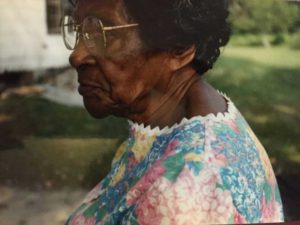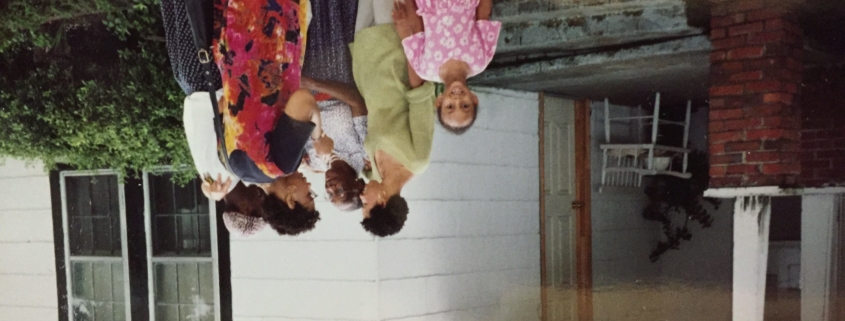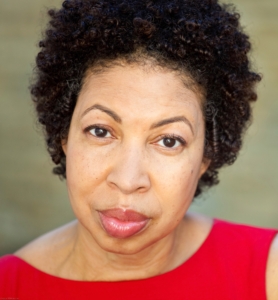On Empathy and Race
My grandparents, Henry Bullock and Lucille Ford Bullock, were farmers and owned their land. They grew corn and tobacco. As a child I helped remove eggs from the chicken coop and heeded the warning to stay away from Henry’s old mule. Lucille canned peaches, pickled cucumbers, made applesauce, jellies, and strawberries stewed in sugar. She stored bags of cut okra, field peas, butter beans, and sweet corn inside a freezer she kept in the hallway of their tin-roofed Carolina house. Corn I haven’t tasted since.

Lucille
As my parents’ generation migrated from the South to the industrial North, this bounty was part of the glue that held the family together. They settled in Baltimore, parts of New Jersey, New York City, and New Haven, Connecticut, and all returned south for summer and Christmas vacations. When my parents couldn’t go home, relatives detoured through Brooklyn to deliver our share of the bounty: boxes and portable coolers filled with homemade canned goods and frozen produce. We quickly stowed them in the freezer. At Christmas, my grandmother sent packages of carefully wrapped pound cakes, pecan pies, and fruitcake, along with bags of shelled pecans harvested from the three trees that stood in her front yard. It was enough of home to last through most of winter’s Sunday dinners.
The harvest maintained our family ties and reminded my parents’ generation, while teaching my own, that we belonged to one another, that we had a legacy. But change brings with it loss as well as opportunity, and the ties that bind a close-knit family wear thin as decades pass, and death brings an end to family ritual.
I’m switching topics now. This remembrance makes me wistful and I feel compelled to write about race. Why? My parents talked about race ad nauseam. For them, the construct of race was an ever-present companion, with Euro-centrism the prevailing default. This construct made it almost impossible for them to live an American life through anything but a racial prism. And when I’m not looking, the construct does the same to me. How comforting it is to slip into racism’s seductive and self-righteous grasp.
Still, there are gifts that pull me beyond my tendency to shrink into corrosive racial isolation. Reading is one such gift. It has always brought with it the knowledge that human experience exists beyond America’s race history. Reading lifts me into a realm of imagining new ways to form community. I imagine communities based on common experience that live beyond color and are built on nurturing curiosity and empathy for the stories of others.
I’ve always been a reader. My father was my first role model. When home and sober, he kept a book in his hand. Starting with his stash of popular pulp fiction, I cultivated a life-long habit and read widely. So when I was told that my writing would only be as good as my reading, in the pursuit of an MFA in Creative Nonfiction, I felt comforted in knowing that reading, the cherished family ritual, would be a necessary component.
My current passion, the writing of memoir, requires that I read widely within the genre. In doing so, I have had to confront my own self-righteous biases around victimhood and suffering: prejudices towards those I assume couldn’t possibly understand or share my pain.
Recently, while reading Caroline Knapp’s Drinking – A Love Story, I became dismissive, thinking to myself — “What could the author possibly have to complain about?” I, at first, refused to see past her race and class. Seeing only a Brown University graduate from a prosperous northeastern white family, I dismissed the narrator’s struggle with the disease of alcoholism as self-indulgent, and smugly put the book aside. While reading Marya Hornbacher’s Wasted – A Memoir of Anorexia and Bulimia, I immediately became as skeptical and dismissive as the clueless medical professionals the narrator described. Why? The author is an affluent young woman, outside of my own racial experience.
Dismissal or disdain is not the job of the creative writer. It distances the artist from her own heart—where the real work happens. As with the very best acting, creative writing requires a large reservoir of empathy from which to draw. Where is my empathy? Has it faded along with the dwindling strands of family tradition?
I’m cognitively aware that human suffering can and does transcend experiences of race. It’s simply that when race fixes itself so thoroughly onto one’s psyche, it can cloud vision. Pickled in personal sorrow, you begin the process of separating from your own humanity.
But I continue to read. And as I do, I again awaken to the breadth and depth of human existence that doesn’t touch upon my race. This knowledge rattles my brain, especially now, as we muddle through another potentially dangerous era of upheaval and social transition. I’m feeling the pull to maneuver backwards toward my own corner of the ring as old resentments bubble to the surface.
The latest opioid epidemic appears to be roaming a nontraditional hunting ground, affecting more and more members of the once racially privileged class, while sidestepping its predatory predilection for the subculture. There has been a recent outcry for better funding to fight the disease of addiction now that white Americans are dying in record numbers, all while thousands of brown and black Americans continue to languish in prison. It seems addiction holds a magical space in our collective consciousness. Depending on those afflicted, addiction swings back and forth between being worthy of treatment and a character flaw worthy of incarceration. This was most recently acknowledged by a Nixon-era White House staffer when he admitted that the War on Drugs was indeed a war on black people. Suddenly I feel a self-righteous gloat in the pit of my stomach as my natural inclination to empathize dissolves.
There has also been an upswing in death due to illness and suicide among middle-aged working class white Americans. The phenomenon labeled “the despair deaths” is due to the free market loss of America’s manufacturing base. My own father died of cancer, drink, and bitterness in 1977 at the age of forty-four, and the give-and-take of so-called free market job creation was never truly a reality for African Americans post-slavery. Again, I sense the schadenfreude rising in my throat.
And finally, I notice in myself, a similar emotional response as I witness the evolving Trump spectacle. Once, the mythology of white supremacy stood to remind true believers of their loftier place in the hierarchy. But ever since a black family moved into the White House it’s been harder to maintain the illusion of manifest destiny, and some are not sure where to place their anger.
I turn off MSNBC and The Huffington Post, and I read. I read about the death of a baby girl written with such ruthless honesty and bruising poetry that it stings. Lidia Yuknavitch’s The Chronology of Water freezes me in the knowledge that the death of a child knows no social status, for there are bones in Carolina fields where babies were buried in unmarked graves by my long dead relations. I read, and my heart softens to the deep pain borne of one of my own young relatives, as I am reminded in blue-eyed prose that the ultimate violation of childhood sexual abuse is without color. I weep as I write these words, for words have the power to foment a kinship, a commonality of experience that transcends the false barrier of racial difference.
That is what reading brings to the table. It exposes truths from other creative gardens. Like my grandmother’s chunky applesauce, the nourishment reading provides nurtures my writer’s imagination. It is food that forces the mind, cracking open a portal through which empathy begins to find its legs. Bridging spaces that separate us by race and class, reading breaks down barriers to true community.
What was it MLK said? “I may not get there with you, but we as a people will get to the Promised Land.” I am nowhere near that Promised Land. I struggle too much with the light and dark of my own inner life. Nor are we as Americans anywhere near that Promised Land. We are too easily manipulated and betrayed by leaders who prey on our fears in order to divide. We The People are wandering in confusion, resentment, and false expectation. The country and the world has turned topsy-turvy. But reading helps remind me that the one race we must concern ourselves with is the race we share—the human one. It encourages me to confront the reality that my own resentment narrows my capacity for empathy and therefore my own humanity.
It might help if we could find a common road by which to travel.
A place to stop along the way to rest—and share a common meal,
Of salty pork and okra, rice and butter beans.
And perhaps, if not too tired, a place where we could sit… and read.
Angela Bullock is an actor/writer pursuing an MFA in Creative Nonfiction at Antioch University LA.






